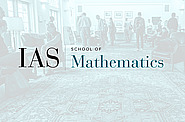2022-2023 Seminars
Dec
12
2022
Computer Science/Discrete Mathematics Seminar I
Optimization-Friendly Generic Mechanisms Without Money
11:15am|Simonyi 101 and Remote Access
Dec
06
2022
Computer Science/Discrete Mathematics Seminar II
Online List Labeling: Breaking the log$^2$ n Barrier
Nicole Wein
10:30am|Simonyi Hall 101 and Remote Access
Dec
05
2022
Computer Science/Discrete Mathematics Seminar I
Optimal Weak to Strong Learning
Kasper Green Larsen
11:15am|Simonyi 101 and Remote Access
Nov
29
2022
Computer Science/Discrete Mathematics Seminar II
The Hypergraph Container Method, Partition Containers, and Algorithmic Applications
10:30am|Simonyi Hall 101 and Remote Access
Nov
28
2022
Computer Science/Discrete Mathematics Seminar I
Algorithmic Stochastic Localization for the Sherrington-Kirkpatrick Model
11:15am|Simonyi Hall 101 and Remote Access
Nov
22
2022
Computer Science/Discrete Mathematics Seminar II
The Polynomial Method in Communication Complexity
10:30am|Simonyi Hall 101 and Remote Access
Nov
21
2022
Computer Science/Discrete Mathematics Seminar I
Strong XOR Lemma for Communication with Bounded Rounds
Huacheng Yu
11:15am|Simonyi 101 and Remote Access
Nov
15
2022
Computer Science/Discrete Mathematics Seminar II
10:30am|Simonyi Hall 101 and Remote Access
Nov
14
2022
Computer Science/Discrete Mathematics Seminar I
Communication and Query Complexity of Bipartite Perfect Matching
Yuval Efron
11:15am|Simonyi 101 and Remote Access
Nov
08
2022
Computer Science/Discrete Mathematics Seminar II
Introduction to Natural Quasirandomness: Unique Colorability and Orderability
10:30am|Simonyi Hall 101 and Remote Access
